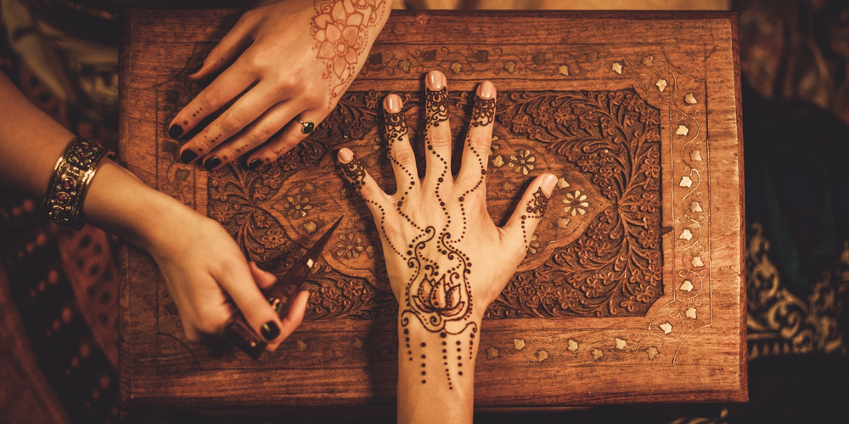
It’s the most wonderful time of the year, as the saying goes.
Personally, I’ve always liked fall better. Octobers are full of crimson trees and pumpkin-spiced everything; the weather isn’t too cold to be constantly sniffling, yet not too hot to darken my sun-lust brown skin into a mid-July charcoal every brown girl fears. Damn, fall is the best.
Yet ever since I was five years old and began my first day in an American school, I was taught the most wonderful time of the year is at its dwindling end—specifically during the holidays when Christmas, Hanukkah, Kwanza and the New Year is celebrated. December in America means Christmas and Christmas meant lights, snow, presents, trees, and God—even though he wasn’t my God.
In kindergarten, I participated in a school-wide nativity play, which we all know today as a classic holiday staple commemorating the birth of Jesus. My mother dressed me up in a checkered black dress with neon pink socks, unbeknownst that my Dr. Seuss attire wouldn’t fit into the sea of my fellow peers dressed as angels. I blindly recited the lines and prayers my teacher told me, and was captivated by cookies, snowmen, ornaments, and gifts galore. I rejoiced the birth of my de-facto savior as I would, by default, every year growing up in America.
Now, seventeen Christmases later, I’m listening to a story on the radio about a Texas mother who was upset at her seven-year-old daughter for arriving from school with henna on her hands. The station played the interview of the enraged mother lamenting “having to go through Christmas with another religion’s symbolism all over [her] daughter’s hands”—all while I’m driving home past houses donned in Christmas decorations and Christian symbolism, some of which have been up since Diwali.
[Read Related: Black, White, and Brown: South Asians in America’s Current Racial Climate]
I’ve been inhaling secondhand Christianity for so many Decembers that the irony took a moment to register. Here is a little girl who, not unlike me as a child, was curious and learning about cultures and religions different from her own. Her innocence is still untainted by the schisms of race and wore henna for an appeal that’s independent of cultural significance, much like I give and receive presents for Christmas every single year. But her mother is upset about a temporary cultural stamp on her daughter when the many non-Christian families in America have been permanently engrained with instructions to consume Christmas culture.
Having a hyphenated identity means carrying the weight of one culture while navigating the world of the other. We’ve taken in every American tradition, sometimes in lieu of our own, in an effort to not only assimilate, but to survive. For those of us who are first-generation Americans, we’ve spent years battling on our Trojan horses made of western customs so that we could be recognized as Americans by our experiences over the color of our skin.
It hasn’t always been a smooth stride to assimilation but hey, who’s to say we haven’t had some good times? At its foundation, the beautiful part about different cultures is the myriad experiences we would not have been able to take in otherwise. We’re lucky we live in America, the world-renowned melting pot. Regardless of religion, us non-Christians love shopping for gifts for our loved ones as much as we love every pop diva’s cover on a classic Christmas song. We’ve taken in holidays and customs as our own not only because we think we should, but also because it’s kind of fun. While being cognizant of cultural appropriation, we should be allowed live and learn and be part of the experiences of others when they welcome us with open arms. The best part about cultures is sharing.
And for the record, henna is beautiful and loved by all; it’s also not a secret cult symbol we’re scribbling on the hands of young, impressionable kids to brainwash them into waging war on Christianity.
Speaking of which, there is no war on Christmas—Christmas is a holiday, not an institution.
I live in Texas as well. And despite how many “coexist” stickers embellish the bumpers of so many cars, many of us have a long way to go in actually heeding its meaning. I truly believe it’s impossible to not feel a part of someone once you get to know them, because despite our many identities of race, sex, or religion we are, after all, the same collection of muscles and bones at our very core. The paradox of culture is that it has the power to both unite us and separate us, depending on how it’s consumed.
If I could meet the mother of this girl, I’d tell her to let her daughter learn about the world as much as possible, and there’s no wrong time to do so.
 Nikita Redkar is a freelance writer in New York City who currently interns for Fusion Network where she writes about diversity in pop culture and how it’s shifting the current landscape of racial and gender politics. When she’s not writing, she is taking classes in sketch comedy and reading bizarre astronomy theories. She likes cute animal gifs and dislikes long walks on the beach, plagues, and other cliches.
Nikita Redkar is a freelance writer in New York City who currently interns for Fusion Network where she writes about diversity in pop culture and how it’s shifting the current landscape of racial and gender politics. When she’s not writing, she is taking classes in sketch comedy and reading bizarre astronomy theories. She likes cute animal gifs and dislikes long walks on the beach, plagues, and other cliches.




